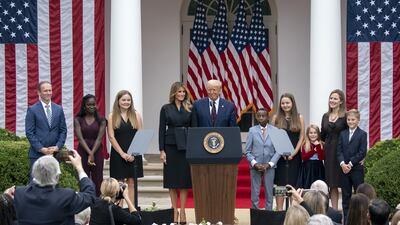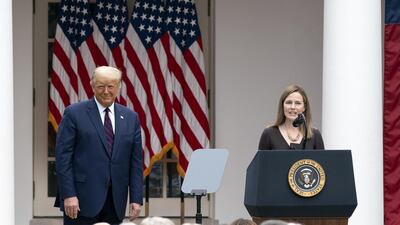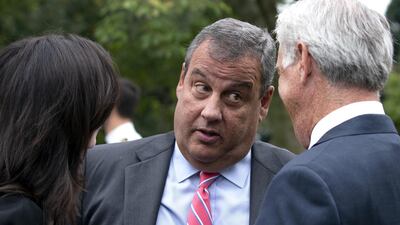Judge Amy Coney Barrett, who was nominated on Saturday to the US Supreme Court, is a darling of conservatives for her religious views – but detractors say her confirmation would shift the panel firmly to the right.
A practising Catholic and the mother of seven children, including two adopted from Haiti and a son with Down’s syndrome, Ms Barrett is personally opposed to abortion, one of the key issues dominating the country’s cultural divide.
As a federal appeals court judge since 2017, she has taken positions backing gun rights and against migrants and signature healthcare reform by former president Barack Obama, which Republicans have tried to dismantle for years.
At only 48, her lifetime appointment to the bench would ensure a conservative presence on the panel for decades, but her background – the antithesis of the justice she would replace, Ruth Bader Ginsburg – is a new flashpoint in an already polarised country.
President Donald Trump announced Ms Barrett’s nomination at the White House and predicted a “very quick” confirmation in the Republican-controlled Senate.
Ms Barrett used her own remarks to try to calm the waters around her already divisive appointment.
She began with an impassioned tribute to Ginsburg, saying: “Should I be confirmed, I will be mindful of who came before me.”
“The flag of the United States is still flying at half-staff in memory of Justice Ruth Bader Ginsburg, to mark the end of a great American life,” she said, and noted the jurist’s pioneering success in law. “She not only broke glass ceilings, she smashed them.”
Ms Barrett also gave a taste of her presentation to the Senate, describing her conservative approach as a judge.
“A judge must apply the law as written. Judges are not policymakers,” she said.
After a childhood in New Orleans in the conservative south, Ms Barrett became a top student at Notre Dame law school in Indiana, where she went on to teach for 15 years.
At the beginning of her legal career, she clerked for the renowned conservative Supreme Court justice Antonin Scalia and took up his “originalist” philosophy of understanding the Constitution as it was meant to be read when it was written, as opposed to more progressive interpretations.
Praised for her finely honed legal arguments, the university professor nevertheless has limited experience of actually presiding over a courtroom, having taken to the bench only from 2017, after being appointed by Mr Trump as a federal appeals court judge.
At the time, her Senate confirmation process was a stormy affair, with Democratic veteran Dianne Feinstein telling her: “The dogma lives loudly within you.”
That statement was used by supporters of Ms Barrett to accuse Ms Feinstein herself of intolerance, and served only to boost her standing among the religious right.
The conservative Judicial Crisis Network went as far as having mugs made with the judge’s picture printed on them next to Ms Feinstein’s words.
Without losing her composure, Ms Barrett responded that she could make the distinction between her faith and her duties as a judge.
But her critics were not convinced. They often cite the numerous articles she wrote on judicial matters while she was at Notre Dame, and point to her recent rulings as a judge, which they say betray her ideological leanings.
In 2018, she was on the shortlist presented by President Trump for a seat freed by the retirement of Justice Anthony Kennedy, a position ultimately filled by Brett Kavanaugh after a ferocious confirmation battle.
Comments Ms Barrett delivered to students at Notre Dame are frequently used to reprimand her.
Presenting herself as a “different kind of lawyer,” she said that a “legal career is but a means to an end ... and that end is building the Kingdom of God”.
“Amy Coney Barrett meets Trump’s two litmus tests for federal judges,” Daniel Goldberg, director of the progressive lobby group Alliance for Justice, said previously.
“A willingness to overturn the Affordable Care Act and to overturn Roe v Wade,” the landmark legislation that legalised abortion in the US.
“This nomination is about taking health care away from 20 million Americans and eliminating protections for Americans with pre-existing conditions. Ms Barrett, who has even opposed ensuring access to contraception, would be a bane to reproductive freedom,” Mr Goldberg said.
At the same time, conservatives hail a woman they consider “brilliant” and “impressive”, with fans online posting memes of her dressed as Superwoman.












